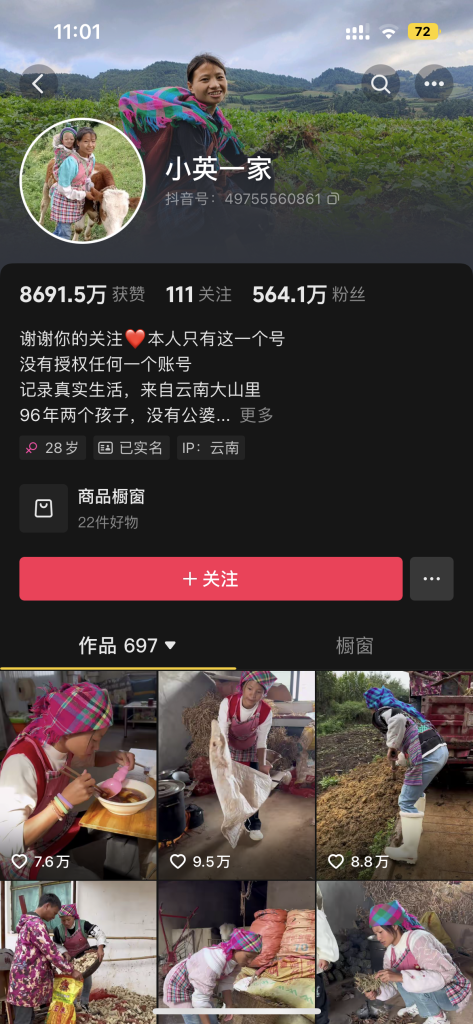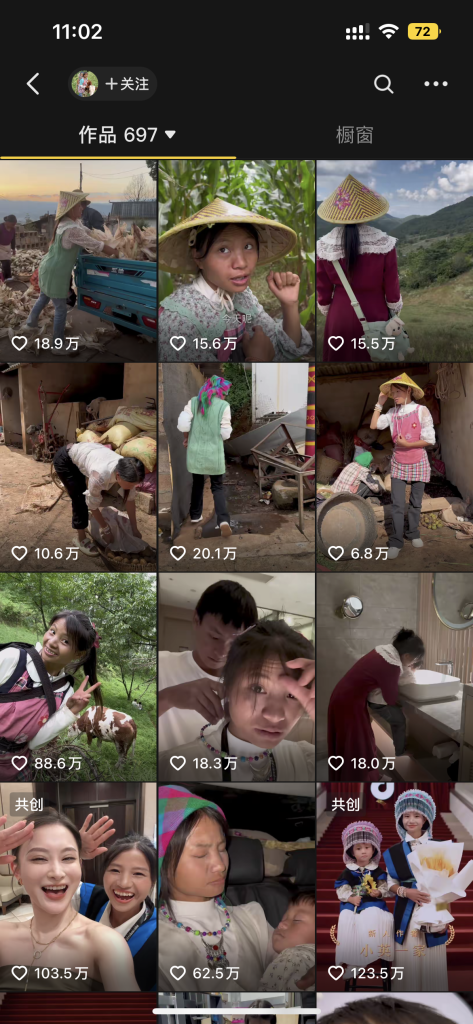

According to Google,Identity construction is the process through which individuals and groups shape their identities based on personal experiences, social interactions, and cultural contexts. It involves negotiating one’s sense of self and belonging in relation to larger societal narratives, often influenced by factors like religion. So if we talk about construction in a digital world, that means we can put this into social media.
In China, we use Douyin a lot. Several months ago, a woman called Xiaoying was be posted. “I have two children, I haven’t been to school, I just farm and raising cattle in the countryside.” This is the definition of herself. Xiaoying’s video mainly records her daily life in rural Yunnan. Every day when the chicken crows, Xiaoying begins to go down to the ground for thousands of work, and then feeds children, feeds cows, mows grass, harvests corn, washes clothes, and takes care of her lazy husband. With this miserable but still positive “person setting”, Xiaoying quickly became popular on the video platform, and her name gradually became equivalent to strong and optimistic. For many people, the absurd humour in Xiaoying’s life has relieved the pain of his real life, and they seem to relieve the pressure in their own life by watching Xiaoying’s life. As more and more people pay attention to Xiaoying’s account, Xiaoying’s fans also increase to 5 million today. She became the new top trend of the rural track.
But several weeks ago, something went wrong. Netizens say that Xiaoying once had four children, after the first child,she also had two daughters, giving them away one after another. Talking about her family conditions, some netizens who claimed to be nearby villagers said that the house in the area where Xiaoying’s family lived are all built by the government and have public transportation. It is only more than two hours away from Kunming.
So it can be seen that Xiaoying’s family is not as poor, bitter and miserable as the video shows.
Xiaoying has built a specific identity through the video, that is a woman struggling in adversity. Xiaoying’s content conforms to the principle of “person setting” .Her image of “hard-working mother” attracts the audience’s emotional sympathy, promotes the increase of traffic, and becomes a carrier of emotional resonance. This identity construction not only affects her personal brand, but also reflects the society’s expectations and recognition of specific identities.
However, once there is a controversy behind her life, such as being exposed to adopt her two daughters, the effect of the media’s re-spread makes negative information spread rapidly. This reversal also illustrates the double-edged sword effect of the media in shaping the image and disseminating information. With the emergence of controversy, the reversal of the theory reflects the “information dissemination and public opinion reversal effect” of network communication, that is, the audience’s evaluation of the content will change due to new information.



Your blog does a great job of highlighting the boundary between digital identity and reality. Even though constructing a digital identity is entirely in our control, and people know they’re only seeing what others want them to see, they still hope to see something genuine. So, when we use digital identity to gain attention, it’s best to be mindful of this and avoid letting our digital identity backfire on us.